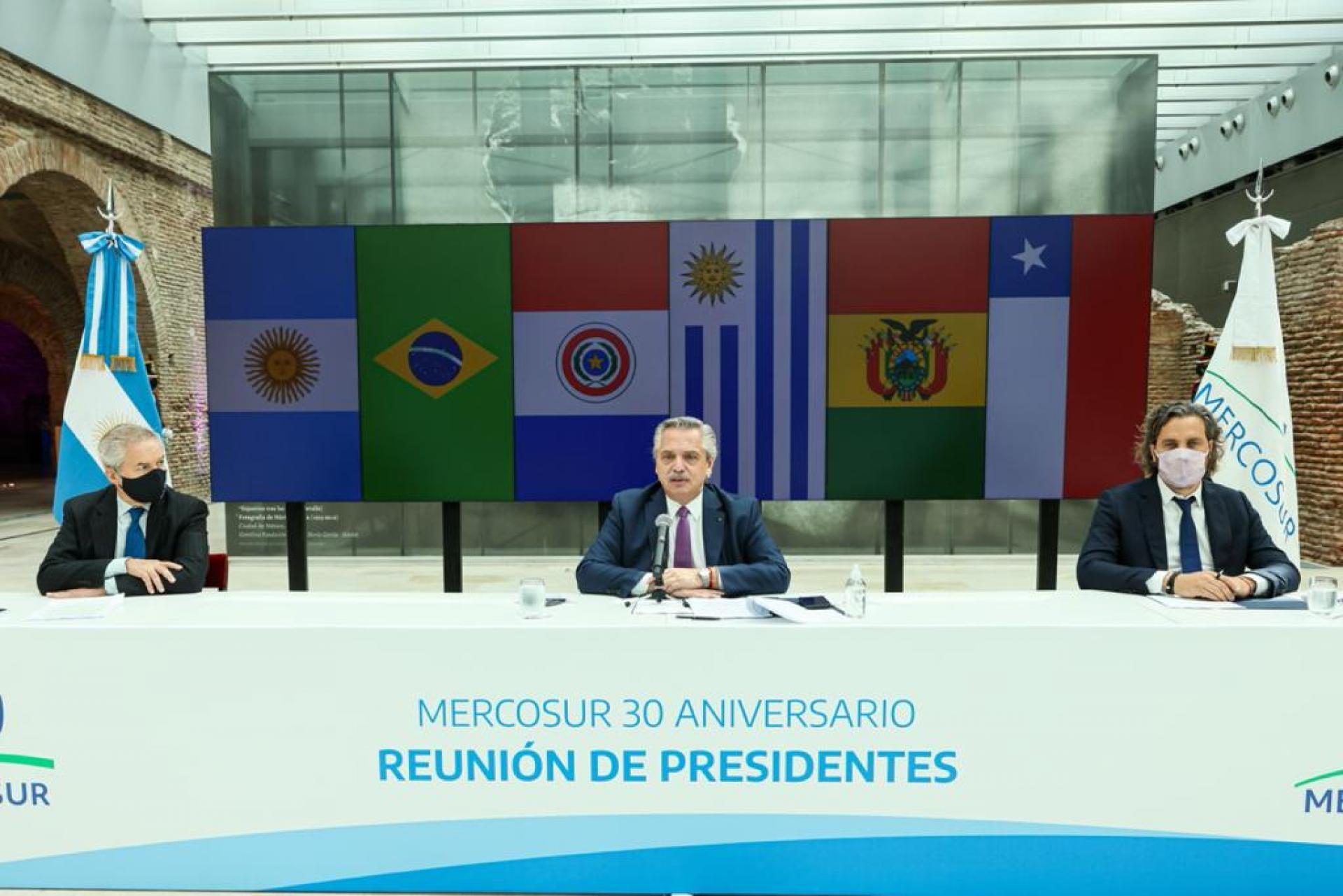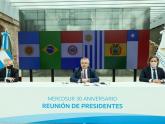At the Bicentennial Museum of Casa Rosada, President Alberto Fernández chaired a virtual meeting with his counterparts from Brazil, Paraguay, Uruguay, Bolivia and Chile to celebrate the 30th anniversary of the Treaty of Asunción, whereby Mercosur was created.
The meeting, which was held virtually due to the COVID-19 pandemic, was attended by the President of Brazil, Jair Bolsonaro; the President of Paraguay, Mario Abdo Benítez; the President of Uruguay, Luis Lacalle Pou; the President of Bolivia, Luis Arce; and the President of Chile, Sebastián Piñera. President Fernández was joined by Chief of Cabinet Santiago Cafiero and Foreign Minister Felipe Solá.
As he delivered the opening address —due to Argentina holding the Pro-Tempore Presidency of the bloc— President Fernández assured that “it is better for all Member States, regardless of any partisan or ideological affiliations, if we build a more solid and united bloc with a stronger international presence and with a capacity to create long-term regional interests.”
“We are a peaceful bloc, with no rifts, which maintains dialogue and cooperates to imagine and build a path towards development jointly. This is important for our peoples and institutions, as well as for many partners, investors, entrepreneurs and people from other parts of the world who wish to develop projects and promote partnership building with us,” said the Argentine President.
President Fernández also stressed that, since it was created, Mercosur has enabled us to “move from a rivalry-based approach to a cooperation-based approach” and to promote “solidarity-based regionalism in political, economic and social matters because we know that facing difficulties together makes us stronger.”
As he addressed the COVID-19 pandemic, which he described as a “tough moment and a global health emergency,” he encouraged the regional bloc to adopt “the concept of solidarity-based regionalism in health-related matters, because we have the human and material capacity to work in a cooperative and solidary fashion so as to bring our peoples, especially the most vulnerable ones, some relief and solutions.”
For his part, Brazilian President Jair Bolsonaro, who was joined by Brazil’s Foreign Minister, Ernesto Araújo, and Brazil’s Minister of Economy, Paulo Guedes, said that “with respect to Mercosur’s fundamental idea, we have to set an example with concrete results, by creating jobs for our people, supporting our business owners and offering cheaper, higher quality goods for consumers.”
Mr. Bolsonaro also reaffirmed “the decision made by our countries three decades ago” when they created Mercosur and said that “efforts should be stepped up to consolidate democratic governments, broaden trade links, promote cooperation among our countries and secure the position of our economies in international markets.”
For his part, Paraguayan President Abdo Benítez stressed that “since it was created, Mercosur has served as a tool for democracies, in which political leaders, workers and business owners have found a space for conversation where they can address and find solutions to the issues that concern them.”
In that vein, he emphasized that “any proposal in relation to our bloc should never make us go backwards with respect to the accomplishments and achievements made and the rights acquired along the process. All Mercosur-related efforts in the future should bring something positive and help consolidate effective integration.”
In addition, the Uruguayan President, Luis Lacalle Pou, stated that “MERCOSUR has made more right decisions than wrong decisions,” but he asserted that “we must not settle for that” and claimed that “some matters should be addressed formally.” To illustrate, he stated that “the free-trade zone should be extended and the common external tariff should be reviewed.”
He also stated that bloc members must move forwards together and urged that the regional bloc be made more flexible. “Uruguay needs to make progress. Our people demand progress in the international arena,” he concluded.
For his part, the President of Bolivia, Luis Arce, highlighted “the deep integrational vision of our peoples” and reaffirmed “Bolivia’s will to become a full member of MERCOSUR.”
In turn, the Chilean Head of State, Sebastián Piñera, stated that the regional bloc is “our country’s fourth trade partner, behind the United States, China and the European Union, and the main destination for our foreign investment, amounting to more than USD 56 billion.”
With a population of almost 300 million and an area of approximately 15 million square kilometres, MERCOSUR is known for its great potential in terms of natural resources and food products.
The bloc sells 63% of the world’s soy and is the largest global exporter of beef, chicken, corn, coffee and iron, as well as the eighth largest global automobile producer.
In this regard, the Argentine President highlighted that “throughout these years, we have been able to promote the exchange of added-value products among our partners, which has streamlined non-traditional export activities that create quality jobs.”
Fernández also stated that, since its early beginnings, MERCOSUR has sought to execute trade agreements with all of the countries in the region, as well as with the European Union, EFTA, Israel, Egypt, India and the countries in the south of Africa, among others.
The Argentine President thanked the “continued support provided by MERCOSUR Member and Associate States for the legitimate rights of the Argentine Republic in the sovereignty dispute over the Question of the Malvinas Islands.”
In addition, he proposed creating three observatories within the scope of MERCOSUR: one observatory on the quality of democracy, another one on the prevention of gender-based violence and a third one to raise awareness about the environmental assets in our region.
During the meeting, Foreign Minister Solá presented the MERCOSUR Citizenship Staute (ECM), which sets forth rights and benefits in various fields, such as the movement of persons and residence, borders, employment, social security, education, consular cooperation, communications and consumer protection.
The Statute is the result of a ten-year Action Plan set by the member countries in 2010, in line with the strategy to adopt a multidimensional approach to integration, aimed at achieving sustainable development with justice and social inclusion.
The rights established in the ECM include, among others, the possibility for MERCOSUR country citizens to obtain a residence permit in another country in the bloc through a simplified process, to access formal employment, to study and exercise their rights and freedoms on the same terms as the nationals of such country, and to request the recognition of primary or secondary school degrees so that they have the same validity as in the country of origin.


